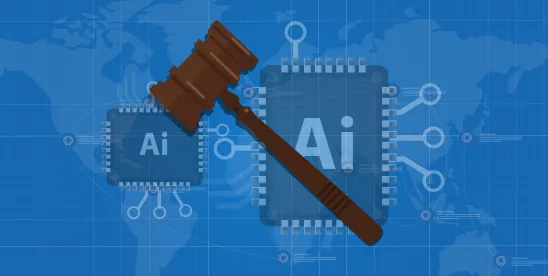On 22 June 2025, the Texas Responsible Artificial Intelligence Governance Act (TRAIGA) (HB 149) was signed into law by Governor Greg Abbott.1 TRAIGA takes effect on 1 January 2026.
Originally introduced in late 2024 as HB 1709 and touted as the most comprehensive pieces of artificial intelligence (AI) legislation in the country (the Original Bill),2 TRAIGA, in its final form, significantly reduces the law’s regulatory scheme—eliminating most of the private sector obligations contained in the Original Bill and focusing on government agencies’ use of AI systems and the use of AI for certain, limited purposes, such as social scoring and to manipulate human behavior to incite violence, self-harm, or engage in criminal activities.
TRAIGA regulates those who (1) deploy or develop “artificial intelligence systems” in the Texas; (2) produce a product or service used by Texas residents; or (3) promote, advertise, or conduct business in the state.
Under TRAIGA, “artificial intelligence system” means “any machine-based system that, for any explicit or implicit objective, infers from the inputs the system receives how to generate outputs, including content, decisions, predictions, or recommendations, that can influence physical or virtual environments.”
Although this definition is broad, the obligations TRAIGA imposes on private employers are much more limited than in the Original Bill.
Key Provisions for Private Employers3
Eliminates Disclosure Obligations
Under TRAIGA, covered private employers are not required to disclose their use of AI, including to job applicants or employees, as they were under the Original Bill. Instead, only state agencies are required to disclose to “consumers”4 that they are interacting with AI and health care service providers are required to disclose to patients when they are using AI systems in treatment.
Only Prohibits Intentional Unlawful Discrimination
Consistent with Executive Order 14281, TRAIGA only prohibits the use of AI systems that are developed or deployed “with the intent to unlawfully discriminate against a protected class” (emphasis added). Disparate impact alone cannot show an intent to discriminate.
Relatedly, unlike in the Original Bill, employers are no longer required to conduct impact assessments, which were aimed at identifying and mitigating algorithmic bias.
Focuses on Specific, Harmful AI Uses
Instead of broadly regulating the use of AI in Texas, TRAIGA focuses on specific, harmful uses of AI, prohibiting:
- The development or deployment of AI systems that are intentionally aimed at inciting or encouraging self-harm or criminal activity;
- The development or distribution of AI systems to produce child sexual abuse imagery or deep fake pornography, or that engage in text-based conversations that simulate or describe sexual content while impersonating or imitating a child; and
- Government entities’ use of “social scoring,” which means evaluating or classifying people based on social behavior or personal characteristics and assigning them a social score or similar valuation that may result in detrimental or unfavorable treatment of a person or group or that may infringe on someone’s federal or state rights.
Eliminates Risk Mitigation Policy Requirement
AI developers and deployers, such as employers, are not required to implement a risk management AI policy, as they were in the Original Bill.
However, discovering violations by complying with a risk management framework for AI systems, such as the National Institute of Standards and Technology’s “Artificial Intelligence Risk Management Framework: Generative Artificial Intelligence Profile,” can help entities avoid liability if charges for violating TRAIGA are brought against them by the Texas Attorney General’s Office (Texas AG).
Keeps AI Regulatory Sandbox Program
Consistent with the Original Bill, TRAIGA provides that the Texas Department of Information Resources will create “regulatory sandbox program.” Entities that apply for and are accepted into this program can test AI systems without a license, registration, or other regulatory authorization. The program is designed to promote the safe and innovative use of AI systems, encourage responsible deployment of such systems, provide clear guidelines for developing AI systems while certain laws and regulations related to the testing are waived or suspended, and allow entities to research, train, and test AI systems.
Limits Enforcement and Penalties
The Texas AG has exclusive authority to investigate and enforce TRAIGA violations and there is no private right of action. However, consumers may submit complaints to the Texas AG through an online portal.
The Texas AG can bring an action in the name of the state to enforce TRAIGA and seek civil penalties, injunctive relief, attorney’s fees, and reasonable court costs. If a curable violation is found, between US$10,000 and US$12,000 in civil penalties can be imposed. Remedies for uncurable violations can range between US$80,000 and US$200,000. Continuing violations can result in between US$2,000 and US$40,000 in penalties each day the violation continues.
Recommendations for Texas Employers’ Use of AI
Despite its limited applicability to private entities, covered private employers should take the following steps to prepare for TRAIGA’s 1 January 2026 effective date:
- Implement AI policies, including an AI risk management policy, and trainings to ensure adequate oversight and understanding of AI use, to mitigate the risk of intentional discrimination through the use of AI systems, and to be able to use the risk management policy as a defense to charges of violations brought by the Texas AG. Employers can use Section 551.008 of Original Bill as a guide when developing their risk management policy.
- Audit AI systems and the use of those systems to make decisions to ensure that employers are not intentionally discriminate against job candidates or employees. For example, employers should ask their AI vendors to confirm that the tools do not intentionally discriminate. In addition, employers should include in AI policies and AI-related trainings information about intentional discrimination and the proper use of the AI tools to avoid such discrimination.
- Ensure employers have information about the AI decision-making processes so employers can support their nondiscriminatory and otherwise proper use of the AI tools if challenged.
Conclusion
Although TRAIGA does not contain many of its original regulatory burdens, particularly for covered private employers, the law remains focused on preventing intentional discrimination and ensuring government agencies’ transparent use of AI. TRAIGA is now the latest in the growing body of law governing how employers use AI to interact with prospective and current employees.
Footnotes
1 The final bill is available here: https://capitol.texas.gov/BillLookup/History.aspx?LegSess=89R&Bill=HB149.
2 K&L Gates’ 13 January 2025 alert on the original version, HB 1709, is available here: https://natlawreview.com/article/texas-responsible-ai-governance-act-and-its-potential-impact-employers.
3 TRAIGA also contains several provisions that govern state agencies’ use of AI. This alert does not discuss those provisions in depth.
4 TRAIGA, H.B. 149, § 551.001(2), 89th Tex. Leg., Reg. Sess. (2025). “Consumer” means an individual who is a resident of this state acting only in an individual or household context. The term does not include an individual acting in a commercial or employment context.





 />i
/>i
